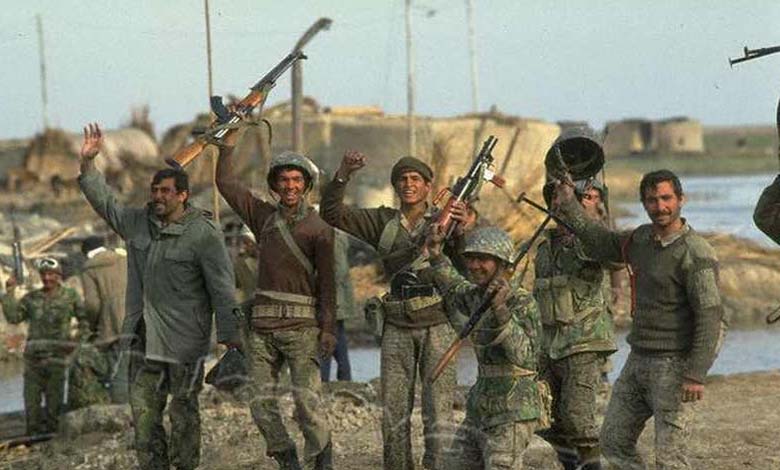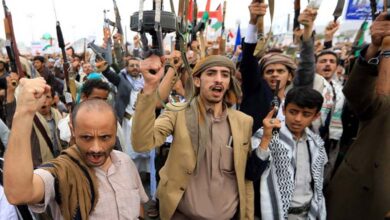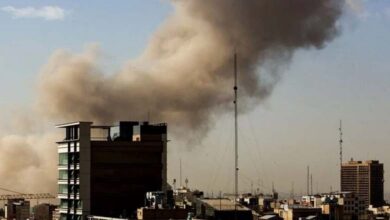Security Campaign Against “Qurbanians” in Southern Iraq Amid Fears of Turning into an Armed Movement
Ten people, including five companions of the Hussaini processions, have been arrested after the group's leader confessed to killing two people as "sacrifices to God".

Iraqi security forces have launched a wide-ranging operation to pursue supporters of the Qurban group south of the city of Nasiriyah, the center of Dhi Qar province (south), according to local media citing security sources, in order to prevent them from transforming into armed groups that threaten the country’s security stability.
The security operation comes amid a climate of security concern and social concern in the country following the emergence of a group calling itself “Qurban” or “Alahia” in the central and southern provinces recently, spreading strange ideas and rituals, including suicide or “self-sacrifice”, in order to get closer to Imam Ali.
The “Shafaq News” website reported on Friday that a security source said, “Security forces launched a major campaign on Thursday evening and Friday against supporters of the Qurban (Alahia) group in the southern regions of Dhi Qar, especially in the Suq Al-Shuyukh district,” adding that “security forces have so far arrested 10 people, including 5 companions of the Hussaini processions.”
The source indicated that “the arrest warrants for these individuals were issued following confessions by the group’s leader, who was arrested more than two weeks ago in Diwaniyah province.”
The source added that “the detainees are currently undergoing strict interrogation in a specialized security center,” noting that “other individuals may be arrested in the coming days.”
On June 17, the intelligence directorate of Diwaniyah province announced in a statement that “intelligence teams had arrested the head of the Alahia movement in Dhi Qar province while he was in the Al-Hamza al-Sharqi district heading towards Karbala province.”
It explained that “after questioning him, the accused had frankly confessed to killing two people, whom he believed to belong to the movement itself, where he had been convicted by the courts and after his arrest, he frankly confessed to these deviant acts.”
Earlier, the police in Dhi Qar province had arrested, in May, 6 members of the group for inciting three of their comrades to commit suicide, which raised concerns within the local community, especially since suicide occurs without hesitation and investigations revealed that some of the suicides were drug addicts and involved in criminal cases.
In recent months, cities in southern Iraq have recorded about 12 cases of suicide among members of this group, leaving most of them written messages stating that they were “sacrifices for Imam Ali”, while their posts on the “TikTok” application showed some of their leaders under strange names and titles such as “Servant of Ali”, “Qurban ibn al-Hassan”, “Abu Leo”, and “Abu Qambar”.
Observers fear that this group may expand, especially as it exploits teenagers. In mid-June, a 15-year-old teenager committed suicide by hanging himself with an electric wire at his home in the Rafai district north of Dhi Qar province.
It appears that this group has clear organization and channels and pages on social media, with some of its symbols and leaders generating great interest.
Images of Abu Leo, who was arrested two weeks ago, show his presence in several Iraqi provinces and his trip to Iran, the goals of his tourist visit or missions for his group have not been revealed.
The “Baghdad Today” website quoted security expert Ahmed Press as saying, “Any deviant idea, no matter how limited its impact, must be treated as a threat to society,” emphasizing that “allowing these ideas to meander should not exclude other agendas for intelligence agencies to harm security, especially in southern and central cities.”
He explained that “suspicious movements that claim to be Islamic are present in all sects and their danger initially seems limited but quickly turns into armed extremism, which is a disaster,” stressing that “the repetition of the rise of these movements raises many questions, the most important of which are who finances them, what is the secret card of their leaders, and who provides the intellectual nourishment to win new followers who end up committing suicide as is happening in the Qurban group.”
The Qurban or Alahia group is a mysterious religious group that has stirred controversy in Iraq, appearing in Dhi Qar province, southern Iraq, and spreading strange ideas and rituals, including suicide or “self-sacrifice” as they call it in religious events.
This group is considered banned by the Constitution and Iraqi laws, its followers believing in the divinity of Imam Ali ibn Abi Talib, cousin of the Prophet Muhammad and the fourth rightly-guided caliph.
The Iraqi Constitution criminalizes the emergence of such trends, with the penalty for their creation or membership ranging from life imprisonment to the death penalty under the provisions of Article 372 of Iraqi Penal Law No. 111 of 1969, as amended.
Article seven of the Constitution prohibits any entity or approach adopting “racism”, “terrorism”, “takfir” or “sectarian purification”, inciting, facilitating, glorifying or promoting these practices.
The emergence of this group in Dhi Qar has raised concerns among residents, especially because its ideology is based on the concept of Qurban (self-sacrifice) during religious events, and to this end, a lottery is organized to choose the person who will commit suicide or sacrifice themselves.
In recent days, there has been information circulating about the suicide of members of the Qurban group in Dhi Qar province, drawing attention from the local and Arab public, and discussed without any detail about this group.
Security and judicial bodies continue to pursue members of these movements and conduct extensive arrest campaigns against them, on judicial orders, as happened with “the owners of the case” and recently with “the Qurban group”, and before them with “the soldiers of heaven” and others.
-
Embezzlement of funds allocated for ISIS victims reveals the extent of corruption in Iraq
-
Withdrawal of Coalition Forces from Iraq: A Renewed Demand Driven by Iran
From time to time, a radical religious group appears in Iraq, led by a person claiming to be a religious man, aiming to destabilize security and destroy the holy sites of the country, visited by millions of citizens each year, against a backdrop of high unemployment and poverty at high levels, as well as protests demanding jobs and work opportunities.











